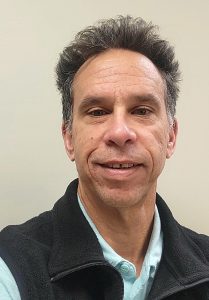Johns Hopkins UniversityEst. 1876
America’s First Research University
A $250,000 gift from the Bender Foundation is giving dozens of patients the opportunity to work with Steven Moreno, a recovery transition guide at Suburban Hospital’s Outpatient Addiction Treatment Center (ATC) in Montgomery County, Maryland.

The gift funds Moreno’s position for three years. In his role, Suburban Hospital patients are referred to Moreno, who maintains contact with them and their treatment providers to assess clinical progress and coordinate any further treatment plans. Patients may require varying combinations of services and treatment components. As the recovery transition guide, Moreno supports and navigates patients during the early stages of their recovery journey.
“The Bender Foundation, Inc. is thrilled to support the pilot of the recovery transition guide at Suburban Hospital’s Outpatient Addiction Treatment Center,” the foundation’s directors say in a joint statement. “Mental health and physical health are two core values of the foundation, and we know that addiction is a terrible disease that lives at the intersection of these worlds. Suburban is a long-time partner of the foundation and we felt that partnering in this new venture was an opportunity to be part of the solution in our own community by uplifting and empowering those who are bravely walking the path to recovery.”
Part of Johns Hopkins Medicine, ATC offers a comprehensive program for counseling and education for those suffering from substance abuse disorders. The goal of the recovery transition guide is to serve 100 patients each year, but since being hired in May of 2023, Moreno has met with more than 170 patients in just six months.
“With the Bender Foundation granting us this gift, it has gotten things moving much faster. The collaboration within the hospital allows me to reach more patients in need of additional resources,” says Moreno. “It’s been a tremendous opportunity. It’s beneficial for the patients and their families.”
Sabrina Cox-Jarrett, ATC program operations manager, shares how the position allows Moreno to follow patients for a period of six months to a year following their discharge from Suburban. Moreno meets patients at their next placement of their recovery process, whether it’s joining patients at their meetings or connecting with them at ATC. Cox-Jarrett credits Moreno’s years of experience as a counselor at Suburban with giving him the foundation to help patients navigate their journeys to recovery.
“It gives patients an opportunity, if they have a relapse, if they’re unsure or still having problems finding a sponsor or a home group, Steven is available to help guide them and provide ongoing support,” she says.

One patient values the access to Moreno, thanking him “for visiting me and providing me the opportunity to discuss my alcohol abuse issues in a safe and supportive environment. It really did help me to understand how important the journey towards sobriety is to me.”
Recovery from addiction is a long-term process and can require several phases of treatment, explains Kamelia Bayat, administrative director of Behavioral Health at Johns Hopkins Medicine, National Capital Region. She emphasizes how long-term, stable recovery requires treatment to be available immediately.
“Research indicates most individuals need at least three months in treatment to significantly reduce or stop their drug use,” says Bayat. “The best outcomes occur with longer durations of treatment.”
Suburban Hospital serves more than 69,000 patients annually, and from that patient base, Bayat says that approximately 1,000 are identified as needing treatment for alcohol or substance use.
The statistic underscores that additional funding would be crucial in addressing behavior health and substance abuse concerns. Both Moreno and Cox-Jarrett acknowledge that hiring a second transition recovery guide would help to offset the times when Moreno is not available
“It’s a need. It would open the door to helping more people,” says Moreno. “To have additional resources would help capture and reach those individuals who may otherwise fall through the cracks.”
Without the gift from the Bender Foundation, the recovery transition guide would not be available to support those facing addiction. Now Moreno can work with patients on their courses of treatment and recovery. He states the only way to change the mentality behind substance disorders is to have an open dialogue.
“The position is a great opportunity to help the community, hospital, and individuals,” Moreno says. “It is extremely rewarding to be able to see people put the pieces of their lives back together.”
Topics: Friends of Johns Hopkins Medicine, Johns Hopkins Medicine, Strengthening Partnerships